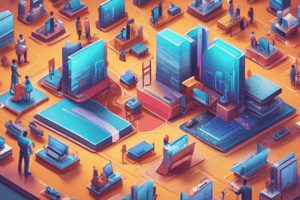Podcast
Questions and Answers
Apa yang mempengaruhi pembentukan ekonomi?
Apa yang mempengaruhi pembentukan ekonomi?
- Produksi dan konsumsi barang dan jasa
- Permintaan dan penawaran
- Pilihan politik
- Sumber daya, budaya, hukum, sejarah, dan geografi (correct)
Siapa yang menentukan apa yang diproduksi dan harga yang dibayarkan dalam ekonomi berbasis pasar?
Siapa yang menentukan apa yang diproduksi dan harga yang dibayarkan dalam ekonomi berbasis pasar?
- Economist
- Pemerintah
- Konsumen
- Produsen (correct)
Apa yang menjadi ciri khas ekonomi berbasis komando?
Apa yang menjadi ciri khas ekonomi berbasis komando?
- Konsumen menentukan harga pasar
- Pemerintah menentukan harga pasar
- Produsen menentukan harga pasar
- Pemerintah menentukan barang yang diproduksi dan harga yang dibayarkan (correct)
Jenis ekonomi apa yang paling umum dijumpai di dunia modern?
Jenis ekonomi apa yang paling umum dijumpai di dunia modern?
Siapa yang menganalisis dan mengukur ekonomi?
Siapa yang menganalisis dan mengukur ekonomi?
Bagaimana AI akan mempengaruhi pekerjaan di ekonomi maju?
Bagaimana AI akan mempengaruhi pekerjaan di ekonomi maju?
Apa dampak AI terhadap kesenjangan?
Apa dampak AI terhadap kesenjangan?
Apa yang diukur oleh PDB?
Apa yang diukur oleh PDB?
Apa tendensi yang sedang berkembang dalam kredit konsumen?
Apa tendensi yang sedang berkembang dalam kredit konsumen?
Apa yang dibutuhkan untuk menanggulangi kesenjangan yang diakibatkan oleh AI?
Apa yang dibutuhkan untuk menanggulangi kesenjangan yang diakibatkan oleh AI?
Flashcards are hidden until you start studying
Study Notes
Economy
An economy is a system of production and consumption activities that determines how resources are allocated among its participants. It represents a nation, a region, an industry, or even a family. Economies are formed according to their resources, culture, laws, history, and geography, and they evolve according to the choices and actions of their participants.
Modern Analysis of Economies
In modern times, economies are analyzed and quantified by economists, who study the production and consumption of goods and services, the distribution of goods, and the allocation of resources.
Market-Based Economies
Market-based economies, also known as free market economies, allow people and businesses to freely exchange goods and services according to supply and demand. Producers determine what's sold and produced, and what prices to charge, with the laws of supply and demand determining prices and total production.
Command-Based Economies
Command-based economies are regulated by a government body that determines the goods which are produced, their quantities, and the price paid for them. This system is often associated with communist or socialist economic systems.
Mixed Economies
In the modern world, few economies are purely market-based or purely command-based. Most economies are mixed, with elements of both market-based and command-based systems.
Global Trends in Economies
AI and the Global Economy
The rapid advance of artificial intelligence has the potential to significantly impact the global economy. AI will affect almost 40 percent of jobs around the world, with advanced economies facing greater risks and opportunities from AI.
AI will transform the nature of work, with almost 60 percent of jobs in advanced economies exposed to AI. However, AI will also impact emerging markets and low-income countries, where AI exposure is expected to be 40 percent and 26 percent, respectively.
The Impact of AI on Inequality
AI has the potential to worsen overall inequality, as it may favor high-income earners with complementary skills. To mitigate these inequalities, it is crucial for countries to establish comprehensive social safety nets and offer retraining programs for vulnerable populations.
The Rise of Buy Now, Pay Later (BNPL) Lending
The use of "buy now, pay later" (BNPL) loans is a growing trend in consumer credit. While credit reporting agencies advocate for the inclusion of BNPL loans in consumer credit reports, BNPL lenders have been reluctant to endorse this proposal.
The Role of Gross Domestic Product (GDP)
GDP measures the monetary value of final goods and services produced in a country in a given period of time. It counts all of the output generated within the borders of a country, including goods produced for sale in the market and some nonmarket production, such as defense or education services provided by the government.
Conclusion
The economy is a complex system of interrelated production, consumption, and exchange activities that ultimately determines how resources are allocated among its participants. As technology continues to evolve and economies adapt, it is crucial for policymakers to address emerging trends, such as the impact of AI on labor markets and the rise of BNPL loans, to ensure that economies remain inclusive and equitable for all.
Studying That Suits You
Use AI to generate personalized quizzes and flashcards to suit your learning preferences.




